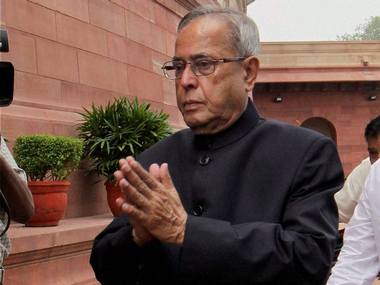The year gone by proved beyond doubt to be a complete disaster from the point of view of the (mis)management of the Indian economy. Frozen into inaction by a popular movement against corruption, the UPA government resembled a deer caught in the headlights of an oncoming vehicle. And since the services of the Finance Minister Pranab Mukherjee, who is also the government’s chief political troubleshooter, were required for all the stratagems and skulduggery that were afoot, and since his ministry had anyway “outsourced” the job of combating inflation entirely to the Reserve Bank of India (RBI), successive rate hikes have effectively squeezed the life out of economic growth.
If there were two words that summed up the Manmohan Singh government this year, they were “policyparalysis.” No major policy decision was taken even as the economy was grinding down, inflation was on the rise, and the rupee was in free fall.
[caption id=“attachment_168861” align=“alignleft” width=“380” caption=“There are several reasons to expect a mild surprise when Pranab-da rises to present the upcoming Budget in end-February. Kamal Singh/PTI”]  [/caption]
Even on the one area in which the government showed some initiative - the decision to permit foreign investment in organised retail - it lost its nerve and hurriedly rolled it back after being blackmailed by Mamata Banerjee and being blackballed by virtually the entire Opposition.
Foreign investors, who saw their faith in the India story erode right through the year, took their money and ran. Indian industrialists, who had no such luxury, fretted and fumed and hinted darkly that although they were sitting on mountains of cash, they would rather invest overseas because of the uncertain domestic policy environment and lack of policy impetus.
For their exertions, they were promptly rapped on their knuckles by Manmohan Singh , who uncharacteristically chided some of India’s leading industrialists for their “negative comments” and for suggesting that the government’s policies were causing a slowdown and pessimism in the industrial sector.
In fact, so acute was the embarrassment over repeated complaints of governmental inaction that Singh’s media managers even had stories planted to let it be known that the prime minister, at age 78, worked no less than 18 hours a day. It was that kind of a year…
But, as the year winds down, there are several reasons to expect a mild surprise when Pranab-da rises to present the upcoming Budget in end-February (or early March, in case the election code says he can’t present a budget when Assembly elections are on). He could well initiate some meaningful reforms. These reasons lie at the intersection of politics and the economy, and in fact, some of them may require the finance minister to act out of compulsion, even if not out of conviction.
First, the fact that elections to some key state assemblies, including the politically significant one in Uttar Pradesh, will be out of the way by end-February, before the budget is presented, frees Mukherjee from having to resort to a populist, giveaway budget. Virtually every year sees some elections: this year, for instance, the elections to several state assemblies, including Tamil Nadu and West Bengal, were held in early May, which cramped Mukherjee from being bold with his budget. This time, he is rid of that populist millstone, and can undertake some reform initiative without the risk of the ruling party having to pay political consequences in the near term.
Second, another key state - Gujarat - will go in for assembly elections later in the year - but the economic dynamics there work differently from how they operate elsewhere. In his time in office, Chief Minister Narendra Modi has raised the bar for economic performance - both industrial and agricultural - with reforms and a reputation for running a corruption-free administration. India Inc has endless admiration for Modi, and some of India’s leading industrialists have publicly expressed a desire to see Modi become prime minister.
The Gujarat assembly election is a high-stakes battle. There is every reason to believe that if Modi wins the election convincingly, he will be less inhibited about projecting himself as a prime ministerial candidate for the BJP. If the Congress is to stop that, it has to out-Modi Modi on the reforms front. That gives the UPA government an incentive to initiate reforms.
Third, the populist giveaways have already been factored into the budget - thanks to the Food Security Bill , introduced hastily with an obvious eye on the UP elections, and the other welfare measures such as the write-off of weavers’ loans.
Pranab-da’s accounts are already blown to bits, and the fiscal deficit has overshot estimates. Quite frankly, the _khazana_ is empty , and there isn’t much more that he can give away without inviting the unkind attention of debt markets and rating agencies, pushing the economy even further into a downward spiral. Unless he can line up a disinvestment programme in double-quick time and initiate subsidy reforms and fire up the economy, the UPA government will be scraping the bottom of the barrel.
Fourth, it makes more sense for Pranab-da to bite the reforms bullet this year rather than next, given that 2013 will be too close to the general election, which the Congress would like to use as a platform to project Rahul Gandhi into office. That is likely to be a blockbuster year for welfare policies and giveaways. In effect, therefore, Pranab-da has a very small window to get his reforms act together.
Most of these reasons, of course, are at the intersection of politics and the economy, but that’s the way the cookie crumbles. A peculiar planetary alignment is in place, and for these reasons, there are better-than-even odds that we might be in for a reforms surprise when Pranab-da poses with his budget briefcase this year.


)
)
)
)
)
)
)
)
)



